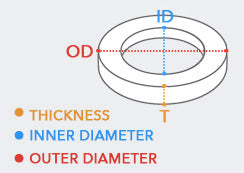Great Magnet
Very strong. Does what I expected. A good product.
Product code: 23003B

Prices are GST Incl.
Volume pricing available on requestAustralia's Leading Supplier
Shipping Worldwide*
30 Day Returns
Same Day Dispatch*

This rare earth ring magnet has an outside diameter of 30mm, an inside diameter of 15.5mm and a thickness of 8mm. It is identified by the AMF magnet part number 23003B.
These Rare Earth Ring Magnets are common components in processing and manufacturing systems. Ring magnets come in a wide range of sizes, with varying inner and outer diameters to suit the particular purpose or application. The inner diameter or void area reduces the overall volume of magnet material and therefore the strength or a ring magnet is less than that of an equivalent sized disc. However, ring magnets are particularly useful for industrial applications where their capacity to be fitted to shafts and used to assist with precision manufacturing is an advantage.
No FAQ available

NB: Ranges are indicative for product category, please check individual products for specic values within that range.



The most common coating for Neodymium magnets is Nickel + Copper + Nickel (Ni + Cu + Ni). This coating offers the magnet relatively good protection from corrosion and passive applications. If the magnet will be exposed to moisture or liquid then consider the use of an organic coating such as Epoxy. A hard wearing coating, Epoxy is suited to applications where the magnet will come under some friction or knocking.

Magnets are readily available in Blocks, Discs, Cylinders & Rings. AMF Magnetics specializes in the supply of short-run prototype magnets including Arc Segments, various magnetic orientations etc. If you need a magnet size that we don't carry in stock, submit a Design-a-Magnet enquiry for a quote on your custom magnet design.

Neodymium magnets are offered in several different grades. The first section N30-54 has an operating temperature of up to 80 degrees. Most of our stock only goes up to N38. The second section, denoted with the "M" prefix after the grade has an operating temperature 100 degrees. After this the grades are "H", "SH", "UH" & "EH". In order for the magnet to withstand a higher operating temperature, during production more of the raw material PrNd is incorporated as these elements have a naturally occurring resistance to high temperatures.

The Pull Force listed for each magnet is based on lifting 10mm thick steel from a horizontal surface. Magnets on a vertical surface (of 10mm thick steel) are generally able to hold around only 30% of the pull force listed in the product description. This is due to the effects of gravity and the lack of friction between the surface and the shiny magnet. Read More